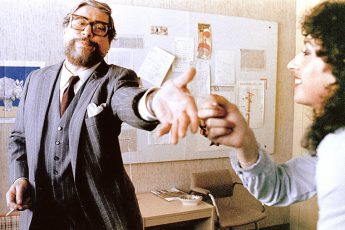Lost in Meta-Absurdism
Petr Zelenka’s Lost in Munich (Ztraceni v Mnichově, 2015)
Vol. 66 (Summer 2016) by Zoe Aiano
Inadequacy, especially male inadequacy, is arguably one of the definitive themes of Czech cinema from the past 50 years, from Closely Observed Trains to Protector. Czechs are often said to suffer from a national trauma caused by the country’s historical inability to fight back against oppressive forces. Within this, one of the most critical moments is the so-called Munich Agreement (or Betrayal) of 1938, when then leader Beneš stood by as France, Italy and Britain granted Germany the Sudetenland region of Czechoslovakia, paving the way for the Nazi takeover of the whole country.
It was perhaps inevitable, then, that a film would eventually address the topic head on. Petr Zelenka’s Lost in Munich does just that through the story of Pavel (Martin Myšička), a frustrated journalist on the brink of losing his career and his wife. Having been sent to a press conference commemorating the signing of the Munich Treaty, he comes to the end of his tether and kidnaps the star guest – a parrot that once belonged to Édouard Deladier, the French prime minister at the time of the agreement. A momentary act of desperation transpires to be something of a boon, however, as the bird begins to utter damning praises in its former owner’s voice praising Hitler and belittling the Czechoslovak nation. Pavel uses his press contacts to cause a scandal, and just as he is about to strike a deal with the French diplomat the narrative suddenly jumps, revealing the true nature of this story – a film within a film (or more accurately, a film within a film within a film).
At this point the frame story shifts to a “making of”, with the cast and crew revealing the details of the ill-fated project, from psychologically induced allergies to affairs, fights and accidental death. In amongst the chaos, the director (Tomáš Bambušek) and the main actor (i.e. Martin Myšička playing Pavel) start to become fixated with the Munich Agreement, and ultimately conclude that the commonly held conception that Beneš committed an act of cowardice is wrong, and therefore the entire Czech national trauma is based on a falsehood. Meanwhile, a parallel falsehood involving the French co-producers is uncovered, providing a critique on the present day European film funding structure, as well as drawing a satirical comparison between the nations of World War Two and the machinations and power structures of the contemporary media industry.
The change in narrative structure from straight comedy to mockumentary comes as something of a relief, at a point when every viewer must have realized that the plot is too thin and incoherent to be able to sustain itself for a moment longer. That isn’t to say that the rest of the film is much more enjoyable, however. The constant parallel-drawing is heavy handed and ultimately distracting, without making the point any stronger (periodic references to Truffaut’s Day for Night only add to this). A similar trait can be found in the director’s earlier work The Karamazovs (2008), where it was handled with much more delicacy despite still being massively redundant and arguably detracting from the main story. While a discussion of such a specifically Czech topic as that of the Munich Agreement was always going to struggle to resonate with foreign audiences, the gimmicky meta-comments used in Lost in Munich are neater than they are meaningful. The references to the movie business in particular are something of an industry in-joke, adding a smug, self-congratulatory and slightly elitist tone that equates to further alienation.
Overall, the debates and ideas raised by Lost in Munich are valid and highly relevant, but the slick format and banality of the jokes primarily detract from any meaningful discussion. This film is unlikely to prove the definitive work on the Czech fixation with cowardice and ineptitude, and it won’t be long before Munich returns to screens in some form or another.




Leave a Comment